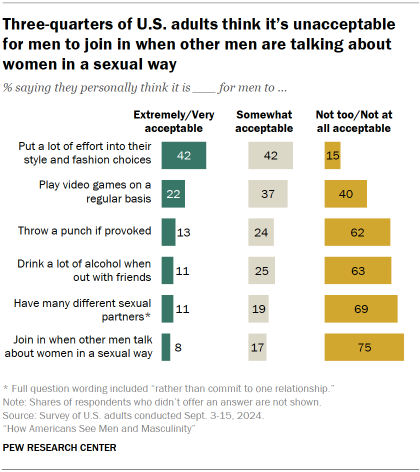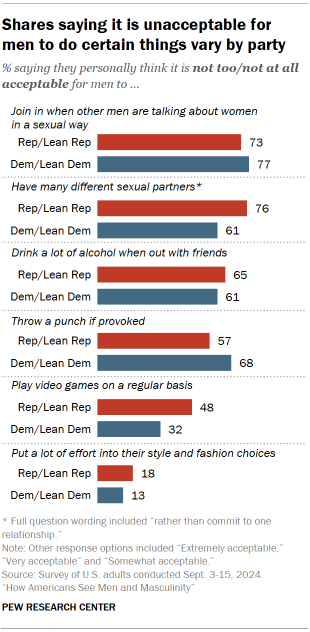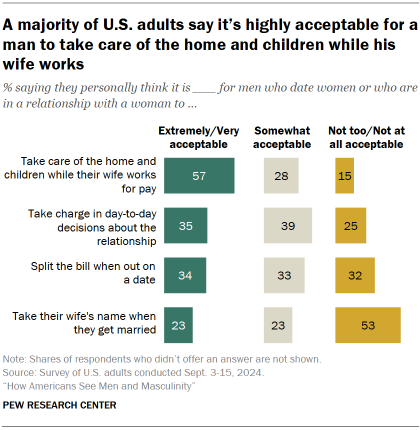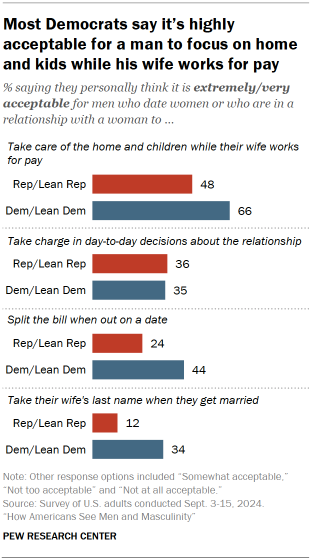When it comes to how Americans view certain behaviors in men, most say they personally think it’s not too or not at all acceptable for men to:

- Join in when other men are talking about women in a sexual way (75%)
- Have many different sexual partners rather than commit to one relationship (69%)
- Drink a lot of alcohol when out with friends (63%)
- Throw a punch if provoked (62%)
Four-in-ten also think it’s unacceptable for men to play video games on a regular basis. Another 22% say this is extremely or very acceptable, and 37% find it somewhat acceptable.
Of the behaviors asked about in the survey, the only one more people find highly acceptable (42%) than highly unacceptable (15%) is for men to put a lot of effort into their style and fashion choices.
Differences by gender
Women are more likely than men to see five of the six behaviors asked about in the survey as unacceptable for men. Still, majorities of both women and men agree that it’s unacceptable for men to join in when other men are talking about women in a sexual way (80% vs. 69%); have many different sexual partners rather than commit to one relationship (74% vs. 65%); drink a lot of alcohol when out with friends (67% vs. 59%); or throw a punch if provoked (66% vs. 59%).
Men are somewhat more likely than women to say it’s unacceptable for men to put a lot of effort into their style and fashion choices (18% vs. 13%), but relatively small shares in each group say this.
Differences by age
Adults under 30 are more likely than those in older age groups to see each of the behaviors asked about in the survey as extremely or very acceptable for men, with differences of 10 points or more on the following items:
- Putting a lot of effort into their style and fashion choices: 58% of those ages 18 to 30, 45% of those 30 to 49, and 32% of those 50 and older say this is acceptable.
- Playing video games on a regular basis: 40% of those ages 18 to 30, 29% of those 30 to 49, and 10% of those 50 and older find this acceptable.
In turn, adults ages 65 and older are the most likely to see almost every behavior we asked about as unacceptable for men. The exception is when it comes to putting a lot of effort into their style and fashion choices. On that item, the difference is between those ages 50 and older and those under 50, with the older group somewhat more likely than the younger group to see this as unacceptable.
These patterns are similar among both men and women.
Differences by party

Majorities of Republicans and Democrats see four of the six items asked about as unacceptable for men. Still, there are partisan differences in how Americans see these behaviors.
By double-digit margins, larger shares of Republicans than Democrats say it’s not too or not at all acceptable for men to have many different sexual partners rather than commit to one relationship (76% vs. 61%) or to play video games on a regular basis (48% vs. 32%).
For their part, Democrats are more likely than Republicans to say it’s unacceptable for men to throw a punch if provoked (68% vs. 57%).
There are more modest partisan differences on other items.
What is and isn’t acceptable in relationships
We also asked some questions about things people may or may not find acceptable for men who date women or who are in a relationship with a woman.

A majority of U.S. adults (57%) say it’s extremely or very acceptable for a man to take care of the home and children while his wife works for pay.
Smaller shares say it’s highly acceptable for men to take charge in day-to-day decisions about the relationship (35%), split the bill when out on a date (34%) or take their wife’s last name when they get married (23%).
Just over half of U.S. adults (53%) think it’s not too or not at all acceptable for a man to take his wife’s name when they get married.
Differences by age
Similar shares across age groups say it’s extremely or very acceptable for a man to take care of the home and children while his wife works for pay. But adults under 30 are more likely than older Americans to say it’s as acceptable for men to take charge in day-to-day decisions about the relationship, split the bill when out on a date, or take their wife’s name when they get married.
Adults ages 50 and older are generally less accepting of these behaviors. For example, most adults ages 50 to 64 (61%) and 65 and older (65%) say it’s not too or not at all acceptable for men to take their wife’s name when they get married. That compares with 48% of those ages 30 to 49 and a smaller share (36%) of adults under 30.
Differences by party

Similar shares of Democrats and Republicans say it’s extremely or very acceptable for men to take charge in day-to-day decisions about the relationship, but larger shares of Democrats than Republicans say it’s highly acceptable for a man to:
- Take care of the home and children while his wife works (66% vs. 48%)
- Split the bill on a date (44% vs. 24%)
- Take his wife’s last name (34% vs. 12%)
Republicans are more likely than Democrats to see each of these three items as not too or not at all acceptable.
Gender and age differences on splitting the bill
Views on whether it’s acceptable for men to do each of these things varies only modestly, if at all, between men and women. For example, about a third of men (34%) and women (33%) say it’s extremely or very acceptable for a man to split the bill when out on a date with a woman.
But an interesting pattern emerges when looking at different age groups.
About half of men ages 18 to 29 (51%) say it’s extremely or very acceptable for a man to split the bill on a date, compared with 39% of women in the same age group. Men ages 30 to 49 are also more likely than women in their age group to say this is highly acceptable, but the difference is more modest (43% vs. 37%).
There is no significant gender gap on this item among those ages 50 to 64. But women ages 65 and older are more likely than their male counterparts to say it’s highly acceptable for men to split the bill on a date (26% vs. 17%).




